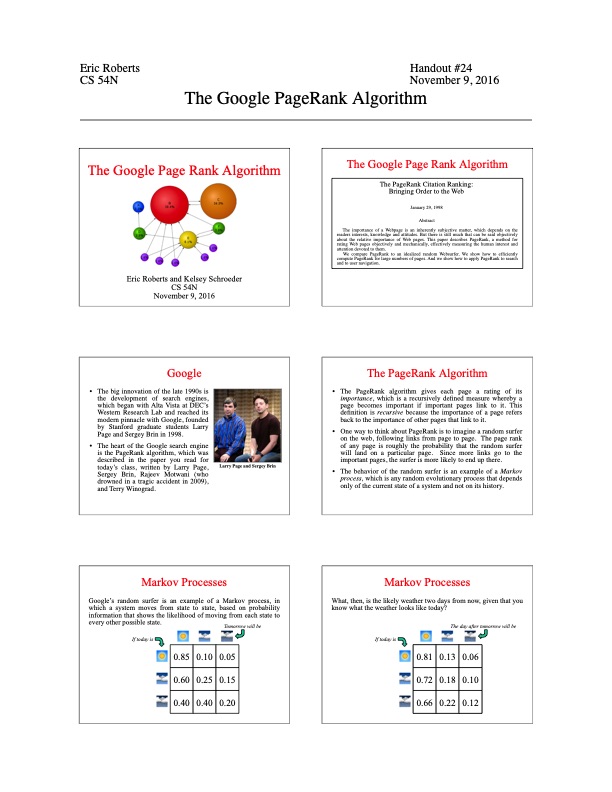
PDF Publication Title:
Text from PDF Page: 001
Eric Roberts Handout #24 CS 54N November 9, 2016 The Google PageRank Algorithm The Google Page Rank Algorithm Eric Roberts and Kelsey Schroeder CS 54N November 9, 2016 The Google Page Rank Algorithm The PageRank Citation Ranking: Bringing Order to the Web January 29, 1998 Abstract The importance of a Webpage is an inherently subjective matter, which depends on the readers interests, knowledge and attitudes. But there is still much that can be said objectively about the relative importance of Web pages. This paper describes PageRank, a method for rating Web pages objectively and mechanically, effectively measuring the human interest and attention devoted to them. We compare PageRank to an idealized random Websurfer. We show how to efficiently compute PageRank for large numbers of pages. And we show how to apply PageRank to search and to user navigation. Google • The big innovation of the late 1990s is the development of search engines, which began with Alta Vista at DEC’s Western Research Lab and reached its modern pinnacle with Google, founded by Stanford graduate students Larry Page and Sergey Brin in 1998. • The heart of the Google search engine is the PageRank algorithm, which was described in the paper you read for today’s class, written by Larry Page, Sergey Brin, Rajeev Motwani (who drowned in a tragic accident in 2009), and Terry Winograd. Larry Page and Sergey Brin The PageRank Algorithm • The PageRank algorithm gives each page a rating of its importance, which is a recursively defined measure whereby a page becomes important if important pages link to it. This definition is recursive because the importance of a page refers back to the importance of other pages that link to it. • One way to think about PageRank is to imagine a random surfer on the web, following links from page to page. The page rank of any page is roughly the probability that the random surfer will land on a particular page. Since more links go to the important pages, the surfer is more likely to end up there. • The behavior of the random surfer is an example of a Markov process, which is any random evolutionary process that depends only of the current state of a system and not on its history. Markov Processes Google’s random surfer is an example of a Markov process, in which a system moves from state to state, based on probability information that shows the likelihood of moving from each state to every other possible state. If today is Tomorrow will be 0.85 0.10 0.05 0.60 0.25 0.15 0.40 0.40 0.20 Markov Processes What, then, is the likely weather two days from now, given that you know what the weather looks like today? If today is The day after tomorrow will be 0.815 0.103 0.056 0.7602 0.2158 0.105 0.4660 0.4220 0.2120PDF Image | Google Page Rank Algorithm

PDF Search Title:
Google Page Rank AlgorithmOriginal File Name Searched:
24-GooglePageRankAlgorithm.pdfDIY PDF Search: Google It | Yahoo | Bing
Cruise Ship Reviews | Luxury Resort | Jet | Yacht | and Travel Tech More Info
Cruising Review Topics and Articles More Info
Software based on Filemaker for the travel industry More Info
The Burgenstock Resort: Reviews on CruisingReview website... More Info
Resort Reviews: World Class resorts... More Info
The Riffelalp Resort: Reviews on CruisingReview website... More Info
| CONTACT TEL: 608-238-6001 Email: greg@cruisingreview.com | RSS | AMP |